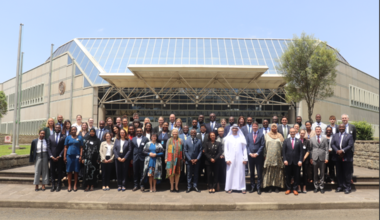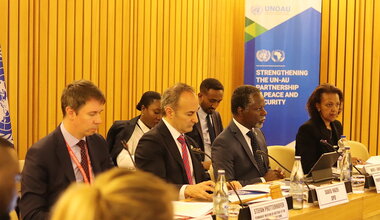UNOAU's Opening Remarks at the AU Policy Forum on Regional Approaches to Dealing with Armed Groups in the Sahel
On 19 and 20 November, UNOAU participated in and supported the AU Policy Forum on Regional Approaches to Dealing with Armed Groups in the Sahel, which was organized jointly by the AU, the Bonn International Center for Conflict Studies (BICC), and the UN Department of Peace Operations (DPO), and took place in Addis Ababa, Ethiopia.
The policy forum was organized as part of a joint project (UN, BICC, AU) funded by the German Federal Foreign Office, focusing on the following border regions: Chad-Sudan-Libya, Chad-Central African Republic (CAR), as well as the Lake Chad Basin. The objectives of the forum included raising awareness of key research findings and policy recommendations; reflecting on the relevance of the research findings; examining how new trends, ideas and leverage points for change can be integrated into policy making and inform AUPSC decisions; and identifying new opportunities for networking and collaboration in future project phases.
The workshop was opened by the AU Director for Governance and Conflict Prevention, Patience Chiradza, who emphasized the timeliness of the forum, particularly in the context of the ongoing PCRD awareness week. She noted the need to better understand the typologies of non-state armed groups operating on the continent, along with related policy implications, as emphasized by the AUPSC. She further highlighted that successful DDR initiatives require regional cooperation and agreements to address the dynamic nature of armed groups.
The Deputy Head of UNOAU and Director of Political Affairs, Gerald Mitchell, in his intervention, emphasized the need of DDR to be integrated into conflict prevention strategies and approached comprehensively, recognizing its linkages with other dimensions of peace processes, including: Security Sector Reform; Transitional Justice; socio-economic development; climate change; and the role of natural resources. The findings of this joint project will form the basis for developing a continental strategy to address the issue of non-state armed groups in Africa.
 UN
UN






